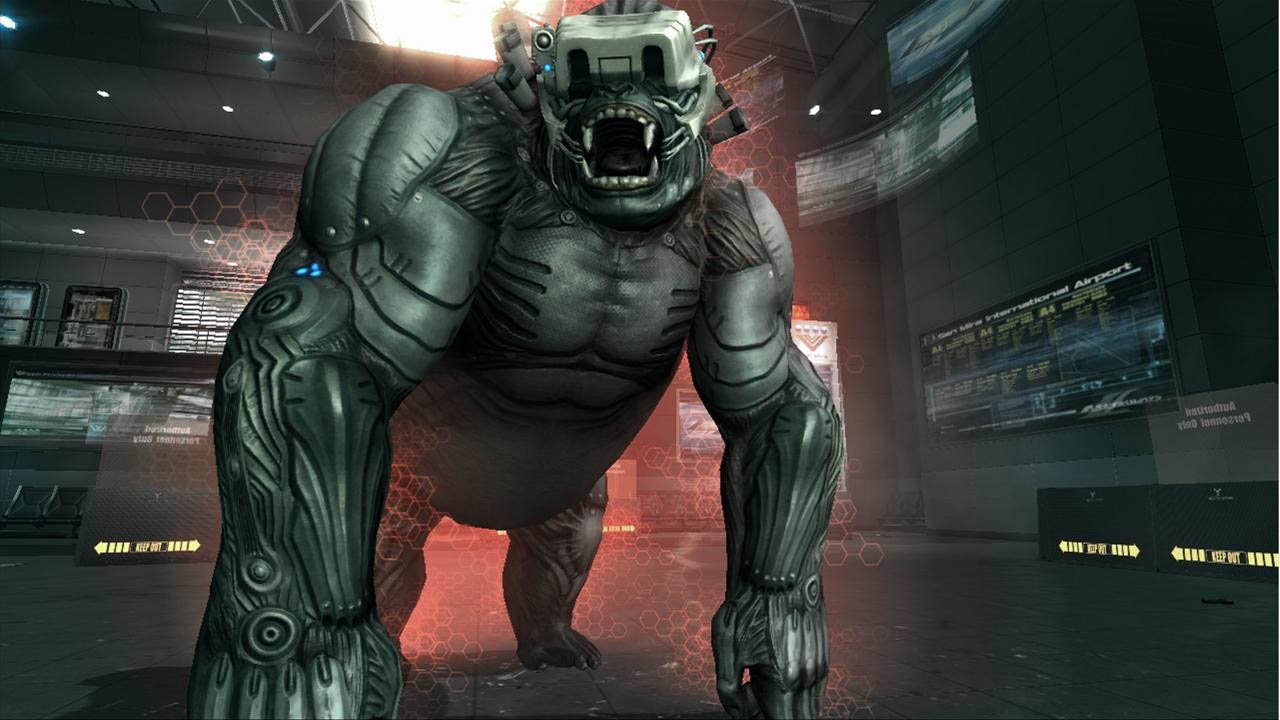Mindjack is not the best cover-based third-person shooter you’ll ever play. It’s flawed, and a number of the developer’s decisions are nothing short of baffling. Even so, the intriguing core concept makes up for a lot of the deficiencies, and the game has a certain campy charm that’s worth a second glance if you’re looking for a new spin on multiplayer design.
The game is set in a high-tech 2031, where FIA agent Jim Corbijn is helping a woman named Rebecca Weiss investigate a shady corporation called NERKAS. The company has invented a new technology that allows people to take over the mind of an oblivious third party, and the premise exists primarily to justify the gameplay.
In Mindjack, you can leap out of a host body and become a Wanderer, a floating cluster of pixels that can hack into (and take over) other individuals. You can mind-slave defeated soldiers to turn them against their former allies and every stage will have multiple mechs, civilians or other NPCs.
The real gimmick, however, is that you’re never really playing alone. Other players can hack into your campaign at any time and they’ll either join the blue team and help you through the missions or join the red team and take up arms against you. It’s all slightly reminiscent of The Matrix, insofar as you’re either a freedom fighter seeking to liberate the minds of humanity or an authority figure looking to keep everyone mentally sedated.
The team set-up distinguishes Mindjack from other multiplayer titles. You’ll seldom play with more than one or two human players and there are no conventional death matches, capture the flag contests, and etc. You’ll instead choose whether to enter a host portal or a hack portal every time you fire up the game and the events play out as a series of instances, each one ending either when the blue team kills all of the enemies or after the red team keeps Jim and Rebecca down for more than ten seconds.
It’s a cool premise (and yes, you can prevent other players from joining your game if you so desire), and there are a few flashes of brilliance. The game never explains why every civilian carries a firearm, but the ability to mind hack construction workers on the other side of the room makes for some extremely dynamic battlefields and the game is at its best when it capitalizes on the unpredictable nature of scenarios that involve multiple player characters.
The problem is that the execution seldom captures that potential, and Mindjack is both inconsistent and severely unbalanced from a level design perspective. Jim and Rebecca are able to revive each other, but the two heroes are heavily outgunned and many of the stages – such as the battles against giant mechs – are nearly impossible to clear if you’re matched against an opponent of a similar skill level.
Some players will switch sides to help a struggling opponent, but the haphazard attention to structural detail nonetheless makes Mindjack feel like a griefing engine that obscures many of its own ideas. The AI, for instance, will intuitively know that you’ve taken over an NPC, so the mind hack ability isn’t as useful in practice as it is in theory. When you leap into a solitary civilian only to find that she’s armed with a handgun and is surrounded by five men with assault rifles, you’ll start to wonder if there’s any point.
Many of the other design elements – from the graphics to the interface – are similarly substandard, and the movement controls are limited and clunky when measured against other cover-based third person shooters. The sprint function is inexplicably mapped to the same button that you use to take cover and navigating between obstacles is always more challenging than it should be.
Enemy soldiers can also absorb an absurd amount of damage. The men in space suits can withstand three sniper rounds to the face, and even unarmored soldiers won’t go down after multiple headshots. Any weapon with a single rate of fire is practically useless, and it makes it doubly frustrating when the game resets your weapon load out after every scene.
Mindjack ultimately plays like a rail shooter, and while the writing is appropriately on par with anything you’ve seen in House of the Dead, Mindjack lacks the self-referential awareness that has come to define that particular franchise. You just get the sense that the scriptwriter isn’t in on the joke as the narrative barrels forward with an inane internal logic that defies all subtlety or explanation.
That’s a concern considering that Mindjack bills itself as a multiplayer shooter that prioritizes story. It’s a bit ridiculous when Corbijn beats someone to death after explicitly being told not to make contact, and I’d given up on coherency by the time I stepped into a boss fight with a giant battle gorilla and his army of robotic monkey minions.
Fortunately, the cut scenes are short and skippable, so Mindjack is able to deliver a steady stream of action and the game is far from broken. Everything is perfectly functional once you’ve adjusted for the cumbersome mechanics and I never encountered any technical glitches while playing. The online servers are equally stable, and it’s easy to jump into any type of session.
That’s why – perhaps against my better judgment – I’m left with a positive impression of Mindjack. The unique take on multiplayer gameplay appeals to a certain aspect of my psyche, and the mere semblance of a plot creates the impression that you’re fighting for something other than a kill streak. It’s a refreshing step away from the de-contextualized free-for-all that dominates the average shooter and I’d actually like to see other developers experimenting with the concept.
So while I wouldn’t say that Mindjack is a good game, it is an entertaining game, and sometimes that’s all that matters. There’s enough novelty to interest armchair game designers and I definitely had fun playing through the various chapters. Rent it if you’re curious and don’t go in expecting much, but keep an open mind and Mindjack might prove to be a surprisingly enjoyable way to kill an evening.




